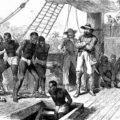Legitimate trade refers to an acceptable, just and a legal trade which involved the buying and selling of goods, products and commodities between African states and European countries as well as American states. The shift to legitimate trade from the erstwhile illegitimate or slave trade was marred with a plethora of challenges which include but are not confined to; lack of a substitute amongst most European countries and American states, resistance by African leaders, the financial crisis faced by Britain, lack of a replacement by African states as well as poor climatic conditions and barren soils in African states which were incompatible with the growth of legitimate crops. The impulse of this paper is to interrogate the challenges which were encountered in the transition to legitimate trade.
Lack of a substitution amongst most European countries and American state was pivotal in derailing the move to legitimate trade. This is because despite Britain having mechanically industrialized and calling for an end to illegitimate trade, most European countries still required slave labour as they had no machines to substitute slaves. For example Portugal in Europe, Brazil, North and South America had a sharp demand for slaves at a time when Britain was calling for the abolition for illegitimate trade or slave trade. This therefore, meant that these countries would partake in slave buying to satisfy their demand of slave labour force which was cheaply drawn from African states like Calabar. Thus, lack of a substitution amongst European countries and American states was significant in derailing the switch to legitimate trade.
Resistance by African leaders was another pertinent factor that constrained the transition to legitimate trade. This is because some African leaders refused calls to do away with slave trade and sail through to a new dispensation of legitimate trade. For instance, a Bonny chief said that it was much easier to catch slaves than to hunt for elephants. These sentiments show his refusal to adopt to the new form of trade. More so, the Efic of Calabar also showed lack of interest in doing away with legitimate trade. Considering the powers that the African chiefs and kings possessed, their decision was final and a policy position. Therefore, refusal by African leaders was essential in constraining the transition to legitimate trade.
The financial crisis faced by Britain was yet another problem encountered in the transition to legitimate trade. This is because Britain was at the forefront of banning slave trade and switching to legitimate trade. In order to achieve this however, Britain was supposed to finance an anti-slavery squandron and team which would monitor, identify and penalise those who still engaged in slave trade. On the contrary, Britain owing to her massive financial turmoil failed to do likewise prompting the undetected continuation of illegitimate trade. Hence, the financial crisis faced by Britain was a critical challenge in switching to legitimate trade.
Lack of replacement by most African countries was another important challenge faced in the transition to legitimate trade. This is because most African states had their economies premised on the bedrock of illegitimate trade. According to Elizabeth Isichei the economy of Asante’s backbone was illegitmate trade. This meant that doing away with illegitimate trade served to mark the state’s collapse as it had no other alternative economic activities apart from trading in able-bodied men and women. Thus, lack of a replacement amongst African states was a grand challenge faced in the transition to legitimate trade.
Poor climatic conditions and barren soils were yet another significant challenge encountered in the transition to legitimate trade. This is because legitimate trade, unlike illegitimate trade demanded favourable, good climatic conditions as well as rich, fruitful soils in which crops like rubber and palm oil would mature. However, some African states such as Asante and Bonny had unfavourable climatic conditions as well as rigid and arid soils which could not support either plantation agriculture or the maturity of legitimate crops. Therefore, poor climatic conditions and barren soils were another problem encountered in the transition to legitimate trade.
Lack of accessibility was another great barrier faced in the transition to legitimate trade. This is because most states in West Africa were geographically distant from the Niger Rivers in which legitimate trade was undertaken. For example, Dahomey and the Sokoto Caliphate. This meant that there was need to find some means of transporting legitimate crops from these inland states to the coast, in order to engage in trade. This was burdensome on the inland state. Hence, lack of accessibility was a challenge encountered in the transition to legitimate trade.
To sum up, this paper has looked closely into the challenges encountered in the transition to legitimate trade. Among many, these include; lack of a substitution amongst most European countries and American states, resistance by African leader, a financial crisis in Britain, lack of a replacement by African states as well as lack of accessibility to the coast by some African states. From the above paragraphs, one can therefore conclude that the transition to legitimate trade was marred with a plethora of challenges.



Latest Comments